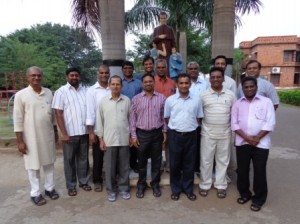
 Hyderabad, 13 December: The YaR (Young at Risk) National Forum of the Salesians in South Asia, headed by Fr. Thomas Koshy sdb, has started on a beautiful journey of research with the young at risk as participants in a research programme. It will have the scope of studying how YaR centres can be run with the active involvement of the children themselves. The directors of 10 YaR centres from five South Indian Salesian provinces met together from 11-13 December at Chiguru, Vijayawada, to chalk out this programme of Participatory Action Research (PAR) in their centres to begin with.
Hyderabad, 13 December: The YaR (Young at Risk) National Forum of the Salesians in South Asia, headed by Fr. Thomas Koshy sdb, has started on a beautiful journey of research with the young at risk as participants in a research programme. It will have the scope of studying how YaR centres can be run with the active involvement of the children themselves. The directors of 10 YaR centres from five South Indian Salesian provinces met together from 11-13 December at Chiguru, Vijayawada, to chalk out this programme of Participatory Action Research (PAR) in their centres to begin with.
Starting from January 2015, the Bi-centenary Year of Don Bosco`s birth, 30 researchers along with the staff and children will be on a 3-year participatory research process. They will be seeking ways of making the YaR centres to be run by the children, for the children and with the children.
The idea of starting a Participatory Action Research programme was first mooted at the National YaR Workshop in March this year on the theme, “Behavioural Difficulties of the Young at Risk“. The findings of a 6-month experiment in PAR with the theme of aggression among children was presented. The response of the participants was overwhelming. The Forum took it up as a national venture and wanted to use the methodology of PAR to make the YaR centres not only more child friendly, but more child directed and child managed. Just as the centres are meant for the children and we are at their service, the research is oriented to make the children not only the participants, but the subjects as well as agents, not objects of the research.
During the three days the participants were introduced to PAR by Prof. Dr. D. Manti, Director of the Institute of Rural Studies and Administration, Guntur. The experience of participatory education and developmental strategies, developed in the seventies by Paulo Freire and Robert Chambers, and adopted in the nineties to assist the rural disadvantaged, is now being applied to the understanding and empowerment of the Young at Risk in our centres. After exploring the key features of PAR, time was spent in exploring the processes of Participatory Monitoring and Evaluation.
Fr. John Tharakan SDB supplemented the sociological and development approach with a psychological approach to social communication as a tool to build up understanding as well as relationship among the PAR participants. He also explored the archetypes of the hero and the heroine on the one hand, and the sage and the mentor on the other, to look at the behavioural difficulties that the children face. Their running away from home is seen as the journey of the archetypal hero or heroine into exile, their struggle with their own shadows as well as other unexpected obstacles that challenge them to trace out a new path to liberation and genuine growth. The care administrators (those who work with the children) could choose to be sages and mentors who accompany these children as they emerge as heroes and heroines. The result would be a behavioural transformation of all the participants in the research, the children, the care administrators and the researchers themselves.
The entire discussion was given depth with the ethnographic approach proposed by Dr. Fr. Jose Maliekal sdb, a philosopher in his own right. He showed the group how understanding the children from a socio-cultural background, assuring their agency and involving them in the research as subjects could make the Participatory Action Research a resounding success.
After a thorough briefing on the subject matter, the directors and the Forum Secretary drew up a practical plan of action for the 30 researchers for the coming three years. The training would include preliminary and advanced training programmes, fortnightly sharing of information, 6-monthly reports and the annual workshop on the findings of PAR. The whole effort will begin with 3-day training in gathering information to do a participatory appraisal of the needs of each centre with a view to transforming their relationship and style of administration with the child at the centre, as subject as well as agent. The stratified data will form the basis for the ongoing monitoring and evaluation of the process by all the participants.
Every participant felt that we are initiating a process whose time has come and felt proud of being part of a process that has the potential to transform the way the children are in our centres and in the society at large. Participation is not going to be just one of the listed rights of children; participation will be what they live, breath and experience.
By John Tharakan